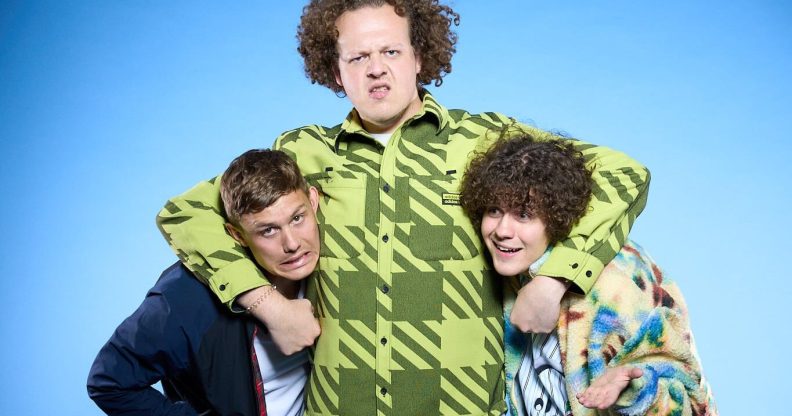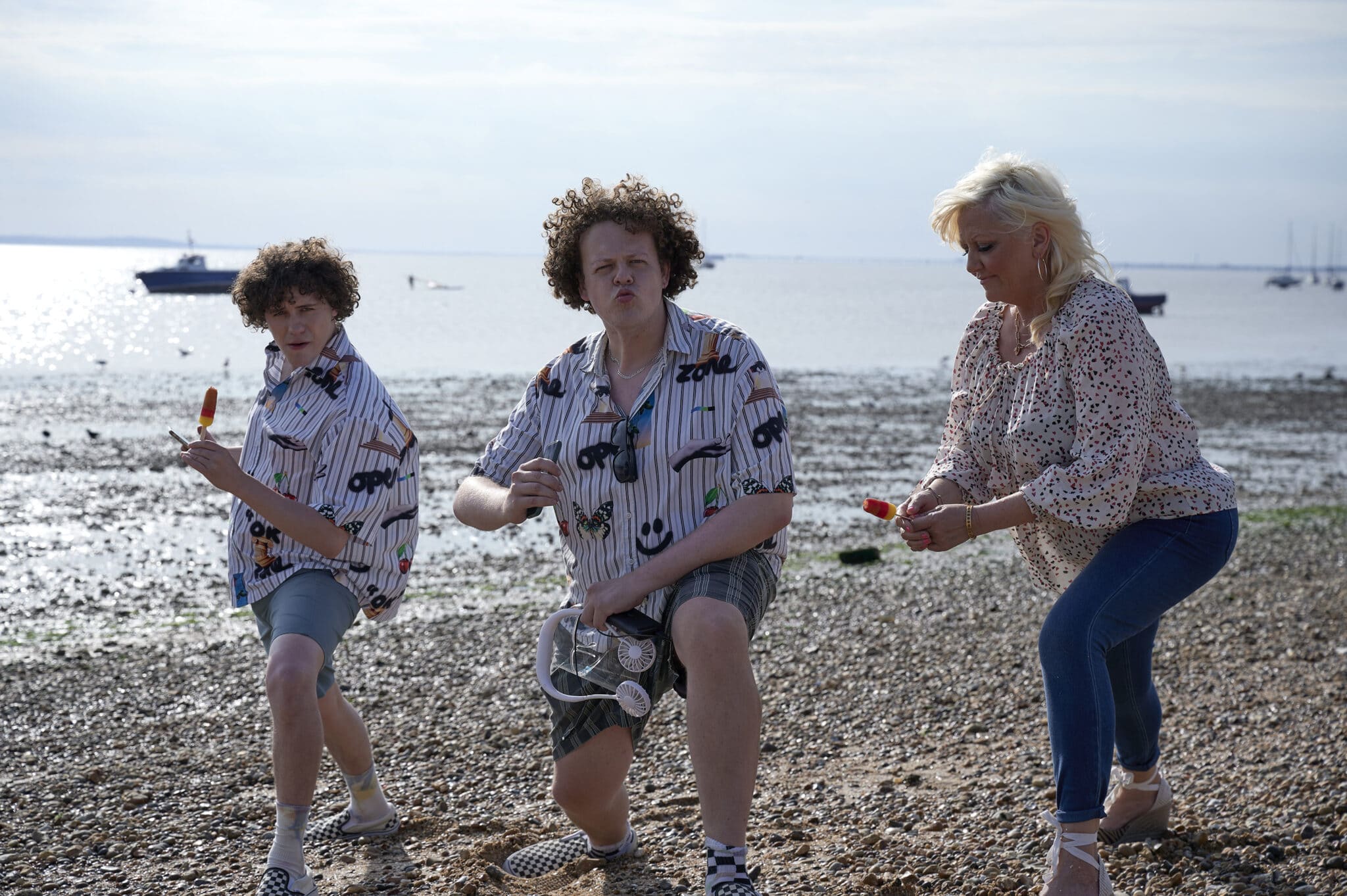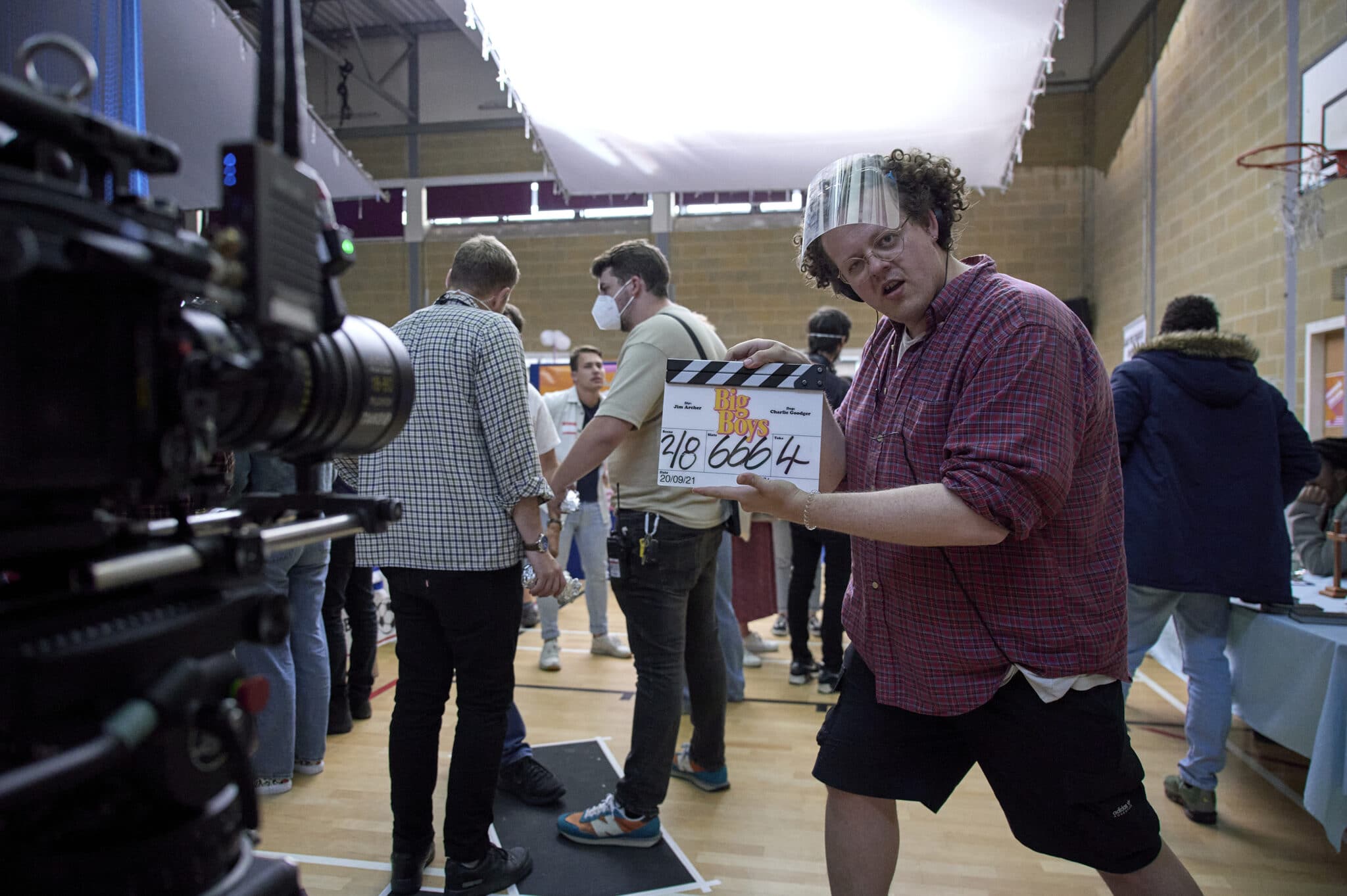Big Boys creator Jack Rooke on working-class queerness and finding beauty in something a bit naff

Big Boys creator Jack Rooke with stars Jon Pointing and Dylan Llewellyn (Channel 4}
We’re almost spoilt for choice when it comes to LGBTQ+ representation on British telly these days.
It’s a Sin was an instant classic while Netflix’s Heartstopper can only be described as a cultural phenomenfon. And shows like Doctor Who, Derry Girls and even Strictly Come Dancing now have blatant queerness in their DNA.
EastEnders even has its own gay bar, for f**k’s sake. For some of us, the best we had for representation while clumsily navigating our first blowjob was John Paul and Craig in Hollyoaks.
The runaway success of It’s a Sin and Heartstopper makes it difficult not to use them as points of comparison when a new episodic TV show with queerness as its heart comes along. But while Channel 4’s funny, moving and quite frankly beautiful new comedy-drama Big Boys may be a show about coming out, losing your virginity, poppers and lube, it’s equally a love letter to working-class culture and, in creator Jack Rooke’s own words, “celebrating naffness”.
Written and produced by comedian and mental health advocate Rooke, Big Boys is a semi-autobiographical journey through his coming-of-age years exploring grief, sexuality, mental health and friendship. It stars Derry Girls‘ Dylan Llewellyn as Jack following the death of his dad Laurie, when he was 15-years-old, through to his time at university, where he strikes up a friendship with mature student and atypical straight lad Danny, played by Jon Pointing.
“I do think with Big Boys I’ve tried to make sure it has a really British working-class lens on it,” Jack tells PinkNews. “What’s been so nice, when I look back at early drafts that I wrote back in 2017 and I look at some of the commissioner notes, it says stuff like: ‘Will people get this [X Factor contestant] Gamu joke? Will people know Alison Hammond?’
“So it’s been really amazing to watch things like Love of Huns take the f**k off in the four or five years since we made the pilot. It’s been so vindicating being, like, ‘Actually, people love this s**t.’ I had proof that those jokes were funny to people.
“Proof that, like… camp, working-class, X Factor on a Saturday with Dermot O’Leary spinning around saying: ‘Your Saturday night starts right here…’ Proof that all that culture really resonates with people. People know it and they love it.
“I do think it’s nice for there to be a scripted show that has jokes like… a fish that’s called Alison Hammond. That’s what I wanted to achieve as a creator.”
Alison Hammond the fish does exist in Big Boys and it is objectively hilarious. But what Jack has also achieved is a show that’s equal parts warm and silly, with a reassuringly familiar cast of characters that will have you bawling your eyes out before you’re halfway through the first episode.
Here, Jack talks to PinkNews about the beauty that we can find in grief, the fight to get authentic queer stories told and his career highlight of filming an episode in a Harvester.
PinkNews: Jack, congratulations on Big Boys. It’s the kind of show that would have meant the world to someone like me, a gay man in his mid-30s, while growing up and coming out. But at the same time, it feels very, very different to shows that have been on our screens in recent years. It feels like the required viewing before watching Big Boys is more likely to be old YouTube videos from 2010 than something like It’s a Sin.
Jack: [Laughs] It’s watching Alexandra Burke, clinging to Beyoncé’s hand. Me and [Olisa Odele], who plays [Jack’s friend in the show] Yemi, that’s what we laugh about when we’re chatting at 3am on FaceTime, moaning about the world. We’re talking about Cheryl Cole’s third album which we felt was underrated.
They’re the cultural specificity points that I think Big Boys has that maybe some of those bigger budget, huge queer productions like It’s a Sin or Heartstopper or Sex Education, etc [don’t]. They are made for, I’d argue, slightly bigger audiences.
There’s no shade to that. I love those shows and I love the scale of ambition. But what I really wanted with Big Boys is for it to feel like a very small, sweet world where those characters are still funny, but we know them.
And I do think that’s also reflective of being a fresher and going to uni, being 18 and being like, ‘F**k, I’ve got to look after myself, got to figure myself out, I’ve got to learn who I am all of a sudden.’

Big Boys creator Jack Rooke with stars Dylan Llewellyn and Camille Coduri (Channel 4)
It almost made me reminiscent of my uni days even though I know they were kind of terrible. But it was my terrible, you know?
I felt like I wanted people to celebrate the nastiness of what it is to go to uni. A lot of people my age – well, our age – are the first people in their families to have gone to uni.
That’s like, if we want to go heavy chat type thing, a real New Labour education policy – let’s get more kids going to uni, let’s get more people accessing those routes to higher education.
What often happens is that the first people in their family to go to uni, they get there and they’re like: ‘What the f**k is this?’ I’d never had any frame of reference.
I’ve never dropped anybody off at uni before. I didn’t have any siblings go. I’m the only one in my family that’s got A-Levels. So I found it all an incredibly intense experience.
And that’s why what you say about the working-class lens in Big Boys is really important. Because, yeah, Heartstopper and Call Me by Your Name were really great – but I never really gelled with those because growing up as a working-class queer kid those worlds just felt so alien to me. Not compared to something like God’s Own Country…
Oh, I’d want it to be more God’s Own Country. I loved the performances in it. I particularly loved Bridget Jones’s mum [Gemma Jones]. For me, it was such a cool film.
It was hot but also like interesting and had a really specific style. I really wanted Big Boys to feel quite cinematic. The director, a guy called Jim Archer, is more of a film director than a TV director.
My naff is still valid and quite beautiful and you can still find really lovely, heartfelt moments in the nastiness of it.
Me and him get on like a house on fire and he’s my favourite ever collaborator really. I didn’t want Big Boys to look like what I see a lot of working-class comedies look like, which is – I don’t want to sound shady – but I just wanted it to look glamorous. To look cool. I wanted it to look like an indie cinema piece but it’s set in Watford and they’re wearing River Island clothes. And they look a bit like you were saying… Like, this is my naff.
But my naff is still valid and quite beautiful and you can still find really lovely, heartfelt moments in the nastiness of it.
There’s a way to do working class that’s not poverty porn. Working class doesn’t necessarily have to mean food stamps and rations like some kind of like Second World War mentality or whatever.
Precisely. You’re totally right, the New Labour class, the whole shebang. I wanted Big Boys to feel like a working-class culture that is accessible and tappable. When working-class people go through something traumatic, or when they go through grief, or when they go through loss, it can still be very beautiful.
There’s this bit in episode two that I love when it’s just Jack and Peggy [Jack’s mum, played by Camille Coduri] on the sofa … that for me was beautifully done. There isn’t this like, big shebang necessarily.
I just really wanted it to feel artful, which sounds so pretentious and w**ky, but I really just didn’t want it to be like… I’m really trying not to sound shady – but sometimes when I watch stuff about like working-class culture, everyone looks like they’re fresh from their job.
You can tell that somebody’s gone round and sprayed everyone’s forehead to look sweaty, straight out the mines.
My mum works in a cafe and stunk of bacon all throughout my childhood. I was always like, ‘Mum, can we go here and go there,’ and she was like: ‘Yeah, we can go in a second.’ And she would take 45 minutes dolling herself up and be like: ‘I don’t care that I’m going to Iceland. I’m dolling myself up because I’m going to Iceland.’
How have you gone through life without using a f**king microwave?
I just really wanted to capture that in Big Boys because I just feel like sometimes it gets lost. Or maybe I just haven’t seen it on the screen as much. As far as I’m concerned, any working-class representation is a win but I just still wanted it to feel very joyful, very silly and very fun.
There’s a whole bit of episode six – the whole episode is pretty much set in a Harvester. Filming in Harvester, for me, was the biggest achievement of my entire career. I’d written like 10 pages of script that was set at the Harvester salad bar, and like, if I can get away with this, we can just have them going around the salad bar because that’s what I remember as a kid. Like going to Toby Carvery or going to a chain restaurant.
It was only when I got to uni that people would be like, ‘I didn’t really go to chain restaurants.’ Blew my mind.
One of my good friends Lucy was just like: ‘Yeah, we never had a microwave. I don’t really how microwaves work.’ How have you got through life without using a f**king microwave? How do you heat stuff up? If you’ve made leftovers – this is it right? – posh people say don’t do leftovers. They don’t batch cook something and then go, ‘I’ll reheat that in the microwave later on,’ because they’ll just make something entirely new.
One thing I really want to talk about, as a card-carrying member of the Dead Dad Club, is how Big Boys has broken the record for TV show that’s made me cry the quickest. I think we were like seven minutes into the first episode.
What really struck me about Big Boys was its depiction of grief and the way it explores how you don’t really get over loss, it doesn’t get any better, you just learn to deal with it more.
One-hundred per cent. You just get more coping mechanisms for it. But it’s still raw, it’s still there and comes in little moments. I still have it sometimes.
The other day, I had it in a café. I was sitting by myself in Waterloo Station and I watched this guy – a really fun, femme camp-as-tits guy. He came up and he sat down and started dragging chairs but, like, really extravagantly, which I loved. He was like: ‘I’m making my table bigger.’
I was expecting it to be like a big queer group of friends and up came his mum, his dad, his grandma and granddad.
I just sat and all of a sudden, like really got me. I was like: ‘Oh, I really want to drag a chair for everyone.’ Yeah, the only person I drag a chair for now is my mum.
It’s still f**king great I’ve got my mum, and I’m so proud of both of us for getting through the loss of my dad. I really love you saying that you liked that scene because really, my mum had as many of those moments as I did. And we just tried to pull one another out.
The other thing about Big Boys is that I didn’t want it to just be a coming out story. It’s not that. It’s about so many different things.
It’s about mental health and depression and how to help a friend going through it. It’s about grief and loss and how experiencing that as a young person, I suppose, ruins your Illusion of life slightly.
I always felt mortality wasn’t really a thing as a kid, and then when you realise that it is, it kind of strips how carefree you are and your understanding of your place in the world. I really wanted the show to be about that as well as all this gay stuff and naffness. Celebrating naffness.

Jack Rooke on the set of Big Boys (Channel 4}
Gay stuff. Celebrating naffness. Being working class. Having a dead parent. Being a student. Mental health. Erectile dysfunction, even. There’s a lot to get your teeth into with Big Boys.
What I’ve loved about chatting to journalists, especially queer journalists, is this understanding of it’s really f**king difficult to get these stories told.
That’s not me putting a slant on anyone – especially not on Channel 4. I love and adore Channel 4. The show wouldn’t have happened without them, quite frankly, because they have such a great history of making shows… that can be about more than one thing.
If you look at like Derry Girls as a prime example. That’s about eight different worlds colliding together and loads of different themes and contextual stuff that I think Channel 4 nails really well.
So I’m immensely grateful. At the same time, the show has taken so long to get made, in a way where I really can’t wait to be in a position where I can Russell T Davies it a bit. Just like, write something and somebody immediately wants to read it.
It’s hard to get queer stories told in a way where there’s a real specificity. That’s the struggle that I have as a writer and it is a constant struggle. But I’m hoping that if series one does well, then it proves testament to the fact that the specificity of those jokes, those cultural references and of those experiences still sing with people, they still appeal and resonate.
I feel like Derry Girls has actually done me a huge favour, and the fact this show is set in like the corner of Northern Ireland, where people speak these really authentic, thick Derry accents, the fact it’s managed to do so well – and globally, too – when it’s still about such a specific experience. I’m hoping that Big Boys does have a wide resonance with people still.
And it feels like because it’s such a struggle, such a fight to get queer stories told, it feels like they need to be as universal as possible, right? So it becomes so much harder to delve into some of the issues that I think Big Boys explores so well, like class and grief.
But there’s actually a lot of different things that you have to go through aside from your queerness when you come out, you know? Grief, for example, can become so much more complicated to navigate when you’re LGBTQ+.
I always find it really odd that I never got to come out to my dad. And it’s a strange one because I don’t like the idea of coming out – I think it’s old fashioned and blah, blah – but, at the same time, God, I wish I could come out to him.
I just feel he always could pick up on certain things. There are some things now I’m like: ‘Oh, he was really trying to reassure me, he was really trying to protect me.’
My dad would take me a lot to like, gigs and stuff and would take me to those areas of Camden and like, Soho. I felt what he was doing was going: ‘I’ve clearly got a f**king gay son.’
I want to say thank you and have him have the moment and all of that stuff. I just think the LGBTQ+ community is inherently linked to loss because of the last great pandemic we all lived through and the echoes of that.
I always feel like it’s affected my identity, almost more having been through grief. It’s affected how I’ve lived my life. I always had a real reluctance to go out and get p***ed and wrecked and take those drugs because I was really conscious I’m my mum’s last thing, I’m the thing that keeps my mum going.
This weird pressure comes on you and you’ve gone through that grief at a young age where you feel you’re protecting the older generation as much as they’re protecting you. It does skew your thinking and, I suppose, your ease at being a young person.
So I hope that Big Boys reflects that and it’s definitely why I’ve chosen people like Dylan and Jon Pointing to front those two characters. They really resonated with the experience that I’ve been through and I felt like I could only trust them with those parts.
The fact that you said you cried seven minutes in at the one-year anniversary scene – in the scripts, that’s when both Dylan and Jon cried.
That’s the thing that makes me know that they’re right to tell the story. A story that other people don’t necessarily get until, eventually, they go through that experience.
Big Boys debuts on Channel 4 on Thursday (26 May) at 10pm.

